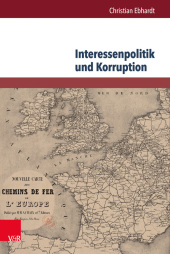 Neuerscheinungen 2015Stand: 2020-02-01 |
Schnellsuche
ISBN/Stichwort/Autor
|
Herderstraße 10
10625 Berlin
Tel.: 030 315 714 16
Fax 030 315 714 14
info@buchspektrum.de |

Christian Ebhardt
Interessenpolitik und Korruption
Personale Netzwerke und Korruptionsdebatten am Beispiel der Eisenbahnbranche in Großbritannien und Frankreich (1830-1870)
2015. 365 S. 23.7 cm
Verlag/Jahr: V&R UNIPRESS 2015
ISBN: 3-8471-0425-X (384710425X)
Neue ISBN: 978-3-8471-0425-4 (9783847104254)
Preis und Lieferzeit: Bitte klicken
Ökonomische Interessenpolitik während der Industrialisierung in Großbritannien und Frankreich
Christian Ebhardt untersucht zwei Themenkomplexe, die in der öffentlichen Wahrnehmung häufig eng miteinander in Verbindung stehen: Wirtschaftslobbyismus und Korruption. Am Beispiel der Eisenbahnbranche vergleicht der Autor Großbritannien und Frankreich und untersucht, wie sich dort jeweils die ökonomische Interessenpolitik während der Industrialisierung entwickelte und wo diese als Korruption angreifbar wurde. Das 19. Jahrhundert stellt eine Übergangsperiode dar, in der hierarchische Patronagestrukturen gegenüber Netzwerkstrukturen an Bedeutung verloren. Korruptionsdebatten halfen dabei, Grenzen legitimer Handlungsweisen auszuhandeln und zu definieren. Sie konnten aber auch als persönliche Angriffe Konkurrenten diskreditieren und wirtschaftliche sowie politische Ordnungsmuster delegitimieren.
The authorexamines two topics that are often closely linked in public perception: lobbyism and corruption. The development of modern lobbyism in Great Britain and France is studied in the context of the railway industry by using a comparative approach. Furthermore it is of interest, when and how certain practices came under public scrutiny and could be criticised as corruption. Regarding personal connections between proponents of the railway industry and the state the 19th century marks a transition period. Hierarchic organized patronage structures of the early modern period gradually lost importance while network structures mainly based on economic capital gained influence. Violations of the already widely accepted division between the economy and the state were often negotiated in the context of corruption debates. These personal connections between both spheres came under pressure, when the exchange of economic capital became too obvious. Allegations of corruption could fulfil different purposes. As personal attacks they could discredit economic and political rivals. As general allegations corruption could de-legitimize economic and political systems.
Ebhardt, Christian
Er hat in Mainz und Glasgow Mittlere und Neuere Geschichte sowie Buchwissenschaften studiert und 2014 an der Technischen Universität Darmstadt promoviert.


